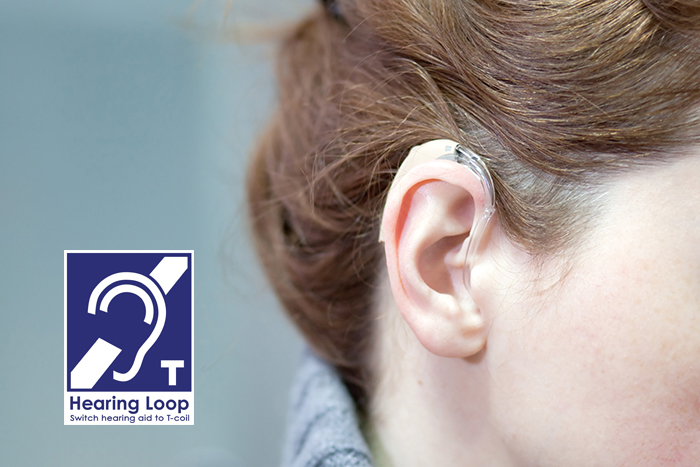New technology improves the classroom experience for those suffering from hearing loss.
Having difficulty hearing can yield many challenges. But a hearing loop system—such as the technology Adelphi University has installed—can help improve daily life.
Europe was first in using the technology, and a recent surge in popularity and public usage in the United States has emerged. Adelphi has followed that trend.
A hearing loop allows hearing aids and cochlear implants to pick up speech in a clear, crisp manner, with background noise eliminated. About 70 percent of hearing aids and all cochlear implants in the country have this function, which is activated by a button on the device, built in. In its simplest form, an induction loop system uses a copper wire, installed around the perimeter of a room and connected to an amplifier, or loop driver, which sends an audio signal through a PA or microphone system to the loop wire (or antennae) to create a magnetic signal. The telecoil, or t-coil—a small coil of wire inside a hearing aid—then receives the signal.

While other colleges and universities use this technology for performance or lecture setups, Adelphi installed the system into a classroom in Post Hall, at the request of School of Social Work Associate Professor Richard Francoeur, Ph.D.
Through his own investigation and consultation with an audiologist, Dr. Francoeur, who has hearing loss, found that a hearing loop would help him teach.
“I have gradually come to realize that I feel more relaxed in class, now that I am not anticipating and straining to hear students with high voices, especially when they are sitting across the room,” he said. “Given the natural loss of hearing that occurs with aging, I think that, in the coming years, more Adelphi faculty will have the opportunity to benefit from this classroom technology.”
In most cases, a hearing loop is installed to benefit the audience, such as at a rock concert. Adelphi’s classroom hearing loop was designed to benefit everyone in the room.
The unique installation allows the professor to hear students with less background noise. And, if a student suffers from hearing loss, they too can connect to the loop by using their t-coil program, decreasing distracting elements that result from hearing loss.
The hearing loop project was commissioned to Acoustic Loop Innovations, a regional leader in the technology. After the installation, the company’s owner, Carol Letzter, Au.D., and audiologist Roseann Spatz, Au.D., trained Adelphi faculty and staff.
“The nice thing about the hearing loop is that it is universal to any hearing device that contains a telecoil or t-coil, regardless of the manufacturer,” said Dr. Letzter, an advocate for improving the lives of individuals who suffer from hearing loss. “I’m thankful to Adelphi University for promoting better hearing for individuals with hearing loss by installing a hearing loop. They are setting an example for other Long Island universities to consider installing induction loop systems.”
Students interested in using the technology can file a Petition for Reasonable Accommodations with the Office of Disability Support Services (DSS).
“With over a decade of experience within the field of disability, I have been fortunate to see the numerous benefits that have resulted from advancements in technology,” said Office of Disability Support Services Director Rosemary Garabedian, who has worked in the DSS office since October 2002. “The introduction of the hearing loop on Adelphi’s Garden City campus is just one example of how our office, in collaboration with the AU community, strives to further enhance the [higher education] experience for all by removing barriers and promoting universal access.”
While the hearing loop technology is currently in just one of Adelphi’s classrooms, there are plans to add it in additional classrooms. When it opens in Fall 2015, the Nexus Building and Welcome Center, for example, will have the technology included in two classrooms. A portable hearing loop can also be brought into other campus spaces if necessary.
“The hearing loop technology addresses the needs of both hearing impaired students and faculty at Adelphi,” said Deborah Senzer, Au.D., clinical coordinator of audiology at Adelphi’s Hy Weinberg Center for Communication Disorders. “For those who wear amplification devices, loop technology enhances the listening experience, enabling them to focus on the speaker’s voice with fewer distractions from ambient noise. This is especially important in a classroom situation where acoustics may not be optimal.
“With an increase in younger hearing aid users, Adelphi is certainly providing a much needed service to this community.”
For additional on clinical hearing services for the community, please contact:
Hy Weinberg Center for Communication Disorders
Adelphi University
p – 516.877.4850
For further information, please contact:
Office of University Communications and Marketing
p – 516.877.3693
e – ucomm@adelphi.edu